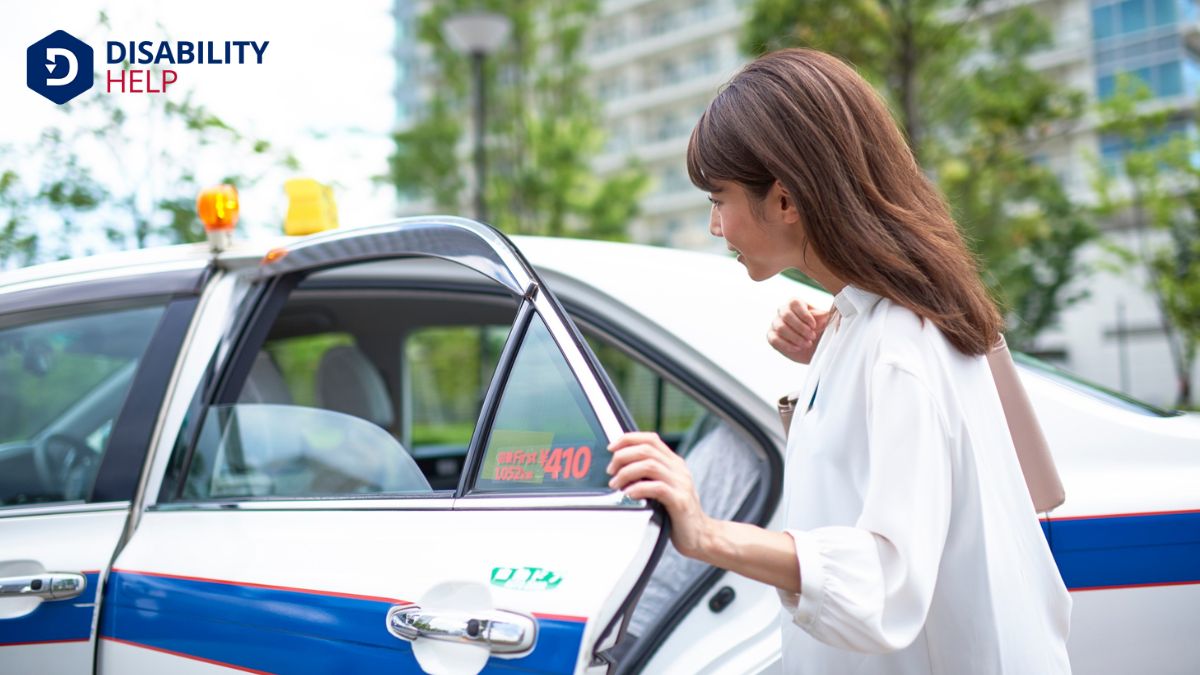As we explore the responsibilities of taxi services in accommodating disabled passengers, we find ourselves traversing a complex landscape of legal requirements and ethical imperatives. Do these services truly meet the standards set by the Americans with Disabilities Act, or do they fall short of ensuring equal accessThe principle that all individuals, including those with disabilities, should have equal opportunity... for all? Let's uncover the intricacies of accessibilityThe design of products, devices, services, or environments to be usable by people with disabilities.... in transportation and discover how technology and policy are shaping a more inclusive future.
Key Takeaways
- Taxi services must comply with the Americans with Disabilities Act (ADA)A U.S. law that prohibits discrimination against individuals with disabilities in all areas of publi..., ensuring equal transportation rights for disabled passengers.
- Companies are required to provide reasonable modifications, including accessible vehicles and trained drivers, to accommodate individual needs.
- Compliance varies by region, with some areas mandating a minimum percentage of wheelchair-accessible vehicles in taxi fleets.
- Training drivers in disability awareness is essential for providing dignified and empathetic service to disabled passengers.
- Financial incentives or grants may be available to support businesses in meeting accessibility requirements.
Legal Framework Governing Taxi Accessibility

When examining the legal framework governing taxi accessibility, it's crucial to understand the laws that guarantee equal transportation rights for disabled passengers. In many regions, the Americans with Disabilities Act (ADA) guarantees that taxis accommodate those with disabilities. The ADA mandates that taxi services don't discriminate against passengers with disabilities, guaranteeing vehicles are accessible or that equivalent services are provided.
We must recognize that compliance isn't just about having accessible vehicles but also about training drivers to assist disabled passengers properly.
The law requires us to provide reasonable modifications in policies and practices to meet individual needs. By staying informed and compliant, we promote inclusivity and guarantee everyone has the right to accessible transportation, making our cities more equitable for all residents.
Ethical Considerations in Providing Taxi Services
In discussing the legal framework, we've seen how compliance helps affirm accessible transportation for disabled passengers.
But beyond legal obligations, we must consider the ethical responsibility of taxi services. Providing equitable access isn't just a mandate; it's a commitment to inclusivity and respect for all individuals.
As service providers, we should endeavor to treat disabled passengers with dignity and guarantee their needs are met with empathyThe ability to understand and share the feelings of another, particularly important in understanding... and understanding.
It's vital that we reflect on the impact of our services on their daily lives. By fostering an environment where all passengers feel valued, we contribute to a more inclusive society.
Let's prioritize training drivers in disability awareness and create policies that go beyond compliance, focusing on genuine care and consideration.
The Role of Technology in Enhancing Accessibility
Let's explore how technology is transforming taxi services for disabled passengers.
Ride-hailing apps now include features like voice commands and wheelchair-accessible vehicle options, making it easier for everyone to book a ride.
With advanced GPS and navigation tools, drivers can efficiently locate passengers and navigate to their destinations, enhancing the overall travel experience.
Ride-hailing App Features
Thanks to innovative technology, ride-hailing apps are transforming how we think about accessibility in transportation. These apps offer features that make it easier for disabled passengers to travel. For instance, we can now request rides with accessible vehicles directly through the app. This guarantees that those with mobility challenges have options that suit their needs.
Additionally, ride-hailing apps allow us to communicate specific requirements to drivers. Whether it's assistance with boarding or extra space for a wheelchair, these features guarantee our needs are met.
Furthermore, apps often include estimated arrival times and detailed driver information, providing peace of mind and reducing anxiety for everyone involved.
GPS and Navigation Tools
Building on the features offered by ride-hailing apps, another technological advancement is revolutionizing accessibility: GPS and navigation tools.
These tools are more than just a convenience; they're a lifeline for disabled passengers. With precise directions and real-time updates, GPS helps drivers find the most accessible routes, reducing travel time and potential barriers.
We can also guarantee that drivers are guided to the exact pick-up or drop-off points, which is essential for passengers with mobility challenges.
Challenges Faced by Taxi Companies
While providing accessible transportation is a noble goal, taxi companies face significant challenges in serving disabled passengers effectively.
First, the cost of retrofitting vehicles to accommodate wheelchairs can be high, deterring some companies from making necessary modifications. Additionally, training drivers to assist passengers with various needs requires time and resources that small companies might struggle to allocate.
Scheduling can also pose difficulties, as ensuring the availability of accessible vehicles at peak times may not always be feasible.
Furthermore, maneuvering regulatory requirements can be complex, as rules for accommodating disabled passengers vary by location.
We must also consider public perceptionThe collective attitudes and beliefs of society towards individuals with disabilities, often shaped ..., as some passengers may not understand the need for modified vehicles, leading to potential misunderstandings.
Addressing these challenges is essential for improving service.
Comparing Regulations Across Different Regions
As we compare regulations across different regions, we notice that regional accessibility standards can vary considerably, impacting the quality of service for disabled passengers.
Compliance enforcement challenges add another layer of complexity as regions struggle to guarantee that taxi services meet set requirements.
Regional Accessibility Standards
When we compare regional accessibility standards for taxi services, it's clear that regulations vary considerably across different areas. Some regions mandate that a certain percentage of a taxi fleet must be wheelchair-accessible, while others have more relaxed criteria.
For instance, urban areas might've stricter requirements due to higher demand, guaranteeing that vehicles are equipped with ramps and safety features. In contrast, rural areas might prioritize availability over accessibility, often due to cost or logistical challenges.
It's vital that we comprehend these differences because they directly impact the availability and quality of service for disabled passengers. Recognizing these standards allows us to advocate for more consistent regulations, aiming to guarantee equitable access regardless of location.
As we navigate this landscape, let's push for improvements that support everyone equally.
Compliance Enforcement Challenges
Maneuvering the complexities of compliance enforcement for taxi services catering to disabled passengers presents a unique set of challenges.
We often find that regulations vary greatly across different regions, creating a patchwork of rules for taxi operators to follow. It's essential to understand that what works in one city mightn't apply in another. This inconsistency can lead to confusion and frustration for both service providers and passengers.
We need to take into account the resources available for enforcement and the penalties for non-compliance, which also differ widely. Additionally, ensuring that taxi operators remain informed and trained on local regulations is an ongoing task.
Let's aim for a more unified approach, making it easier for everyone involved to navigate these important requirements.
The Impact of Ride-Sharing Apps on Accessibility
How have ride-sharing apps reshaped the landscape of accessibility for disabled passengers? They've provided us with more options and convenience.
Before these apps, finding accessible transportation often meant relying on traditional taxi services, which weren't always equipped to meet our needs. Now, with just a few taps on a smartphone, we can request rides that promise to be more accommodating.
However, this new landscape isn't without challenges. Not all ride-sharing vehicles are wheelchair-friendly, and drivers may lack training in assisting disabled passengers.
Despite these hurdles, the potential for improved accessibility exists. As we continue to advocate for better services, the ride-sharing industry can become a powerful ally in enhancing mobility for everyone.
Let's guarantee accessibility remains a priority as these services evolve.
Case Studies of Inclusive Taxi Services
Though often overlooked, inclusive taxi services have made significant strides in transforming transportation for disabled passengers.
Let's explore a few standout examples. In New York City, the Accessible Dispatch program connects wheelchair users with accessible taxis via an app or phone call, ensuring reliable service.
Across the pond, London's iconic black cabs accommodate wheelchairs with ease, making the city more navigable for everyone.
In Australia, the Wheelchair Accessible Taxi (WAT) program offers subsidies and incentives to operators, increasing the availability of accessible vehicles.
These case studies demonstrate that when we prioritize inclusivity, we create a more equitable transportation system.
The Cost Implications of Accessible Transportation
Implementing accessible transportation services comes with its own set of financial challenges, but the benefits far outweigh the costs.
We're looking at initial expenses like retrofitting vehicles and training drivers, which can seem intimidating. However, let's not forget the long-term advantages. By investing in accessibility, taxi services tap into a broader customer base, increasing revenue opportunities.
Moreover, supporting inclusive transportation promotes social equityFairness and justice in the way people are treated, especially in the allocation of resources and op... and enhances a company's reputation.
It's also important to evaluate potential financial incentives or grants available for businesses making these changes. We're not just talking about dollars and cents; we're investing in a future where everyone gets to travel with ease.
Together, we can create a more inclusive community that recognizes the value of every passenger.
Future Trends in Accessible Transportation

As we embrace the financial benefits of accessible transportation, let's explore what's on the horizon for future trends in this essential sector.
Technology continues to transform how we approach accessibility. Autonomous vehicles promise a future where getting around independently becomes a reality for more disabled individuals. These vehicles, equipped with advanced navigation systems, could reduce barriers considerably.
Additionally, ride-sharing platforms are investing in specialized fleets to better serve disabled passengers, enhancing convenience and inclusivity.
Furthermore, smart city initiatives are integrating real-time data to improve transport networks, ensuring we meet accessibility needs more efficiently.
Innovation in vehicle design also plays an important role, with automakers focusing on creating adaptable vehicles.
Together, these trends point to a future where transportation is more inclusive and accessible for everyone.
Conclusion
In considering the legal, ethical, and technological aspects of taxi accessibility, we see it's vital for services to support disabled passengers. While challenges exist, such as cost and regional regulations, we can't ignore the positive impact that inclusive practices have on individuals and communities. As we move forward, let's embrace innovations and learn from successful case studies to guarantee transportation is accessible to everyone. Together, we can drive meaningful change in this essential service.






